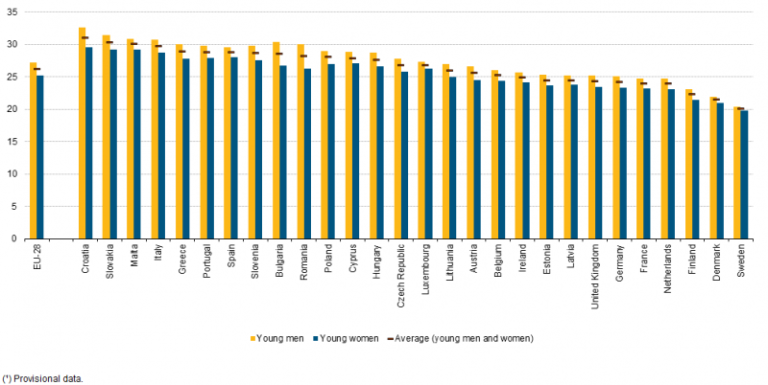 In this Blob a person takes first steps in to adulthood. It is a time when one typically finishes schooling and starts further occupational or academic studies. It is a time for thinking about the future and identifying career goals, as decisions made in these years have lasting implications. It is also a time when many emerging adults move away from their families and get more and more involved with a network of personal friends.
In this Blob a person takes first steps in to adulthood. It is a time when one typically finishes schooling and starts further occupational or academic studies. It is a time for thinking about the future and identifying career goals, as decisions made in these years have lasting implications. It is also a time when many emerging adults move away from their families and get more and more involved with a network of personal friends.
By now physical maturity levels off and the emerging adult is not as preoccupied with body changes any more. Muscle continues to develop at a strong rate. In this Blob, the physical abilities are at a peak, including muscle strength, reaction time, sensory abilities and cardiac functioning. Women are at a peak of their fertility, even though they might not be mentally prepared for parenthood yet.
Mentally, as opposed to what was believed till not so long ago, evidence shows that brain development is not yet complete and that the brain develops further till the end of this stage. Thus abilities such as processing of emotions and social information, of planning and for processing risks undergo further development, making emerging adults more mature than adolescents.
 As compared to the previous stage, the emerging adult typically makes fewer impulsive decisions. Peer groups do not determine behavior as strongly as before. He or she gets a firmer sense of sexual identity and looks for more serious relationships, shifting emphasis from self to others. The emerging adult may now once again be more open to seeking adult advice, although may restrict it to guidance only. He/she may move in to an adult relationship with parents and will want to be treated as a fully grown adult.
As compared to the previous stage, the emerging adult typically makes fewer impulsive decisions. Peer groups do not determine behavior as strongly as before. He or she gets a firmer sense of sexual identity and looks for more serious relationships, shifting emphasis from self to others. The emerging adult may now once again be more open to seeking adult advice, although may restrict it to guidance only. He/she may move in to an adult relationship with parents and will want to be treated as a fully grown adult.
Just a few decades ago, this was also the time when one would become financially independent and commit to long-term relationships and marriage. Today, with the ever-increasing life span of persons in the developing world now going well into the 80s and even 90s, young adults don’t seem to be in a hurry to settle down too soon. Life changing decisions, such as commitments to career and family, that were in the past taken in this age group are now being delayed to the next Blob or even later. According to European statistics from 2013, on average across the EU young people were not inclined to leave the parental home until the age of 27 for men and 25 for women. Whereas in northern EU Member States, young people still tend to leave home in their early twenties, in southern and eastern EU Member States they to leave home much later, in their early thirties.
 Thus, the years of this Blob seem now to be a time for exploration and not settling down, as people in their early 20s try out various jobs, lifestyles, partners, ideas and values. Many still receive financial support from their parents, postpone career choices and come back home for living. In EU-28 countries the share of emerging adults living with their parents in 2013 was around 85 % for young men and 74% for young women. Based on such changes, the new notion of “emerging adulthood” was developed towards the end of the 20th century by Jeffrey Arnett.
Thus, the years of this Blob seem now to be a time for exploration and not settling down, as people in their early 20s try out various jobs, lifestyles, partners, ideas and values. Many still receive financial support from their parents, postpone career choices and come back home for living. In EU-28 countries the share of emerging adults living with their parents in 2013 was around 85 % for young men and 74% for young women. Based on such changes, the new notion of “emerging adulthood” was developed towards the end of the 20th century by Jeffrey Arnett.
According to Jeffrey Arnett “a sense of possibilities” is available to today’s young adults which enables them to delay commitment and take longer to reach adulthood. Milestones do not necessarily need to come in a prefixed order any more: pre-marital sex is generally accepted; kids may come before marriage or out-of-wedlock; taking a break from work and going back to school is encouraged; changing jobs frequently is common; traveling and discovering the world before settling down seems more attractive and doable.
According to an American study by Pew Research Center the share of 18 to 24-year-olds who use online dating has roughly tripled from 10% in 2013 to 27% today. Although many do find their partners via online dating around one-third of online daters have not yet even met up in real life with someone they initially found on an online dating site. Also, according to the study 32% of internet users agree with the statement that “online dating keeps people from settling down because they always have options for people to date.”
This new sense of possibilities is also causing some insecurities and uncer tainity within members of this Blob; a feeling of not understanding where they belong. Some emerging adults feel like both grown-ups and also not-quite-grown-ups. Some are more self-focused and less certain about the future. They are still busy with identity explorations, idealism and enthusiasm about the future, knowing that decisions and actions taken now will have lasting and long ramifications.
tainity within members of this Blob; a feeling of not understanding where they belong. Some emerging adults feel like both grown-ups and also not-quite-grown-ups. Some are more self-focused and less certain about the future. They are still busy with identity explorations, idealism and enthusiasm about the future, knowing that decisions and actions taken now will have lasting and long ramifications.
On the other hand, a reasonable proportion of these emerging adults may have completed their formal education by the end of this Blob. They would have left home, chosen a career path and become financially independent. Some may even have a committed partnership and have concrete ideas about starting a family and taking on adult roles and responsibilities.
Click here for Blob 5: Young Adult
or read about any other Blob:
Spring: 1-6, 7-12, 13-18, 19-24
Summer: 25-30, 31-36, 37-42, 43-48
Autumn: 49-54, 55-60, 61-66, 67-72
Winter: 73-78, 79-84, 85-91, 91-…
Understand why the 7-year life stages are outdated in this Blog
RESOURCES AND REFERENCES
Physical Development in Adulthood from ‘Boundless Resources’
Emerging adulthood and early adulthood from Wikipedia
Emerging Adulthood: A Theory of Development From the Late Teens Through the Twenties by Jeffrey Arnett
Being young in Europe today – family and society by Eurostat Statistics
People in the EU – statistics on household and family structures by Eurostat Statistics
What Is It About 20-Somethings? By Robin Marantz Henig in the New York Times
5 facts about online dating and Online Dating & Relationships by Pew Research Center


